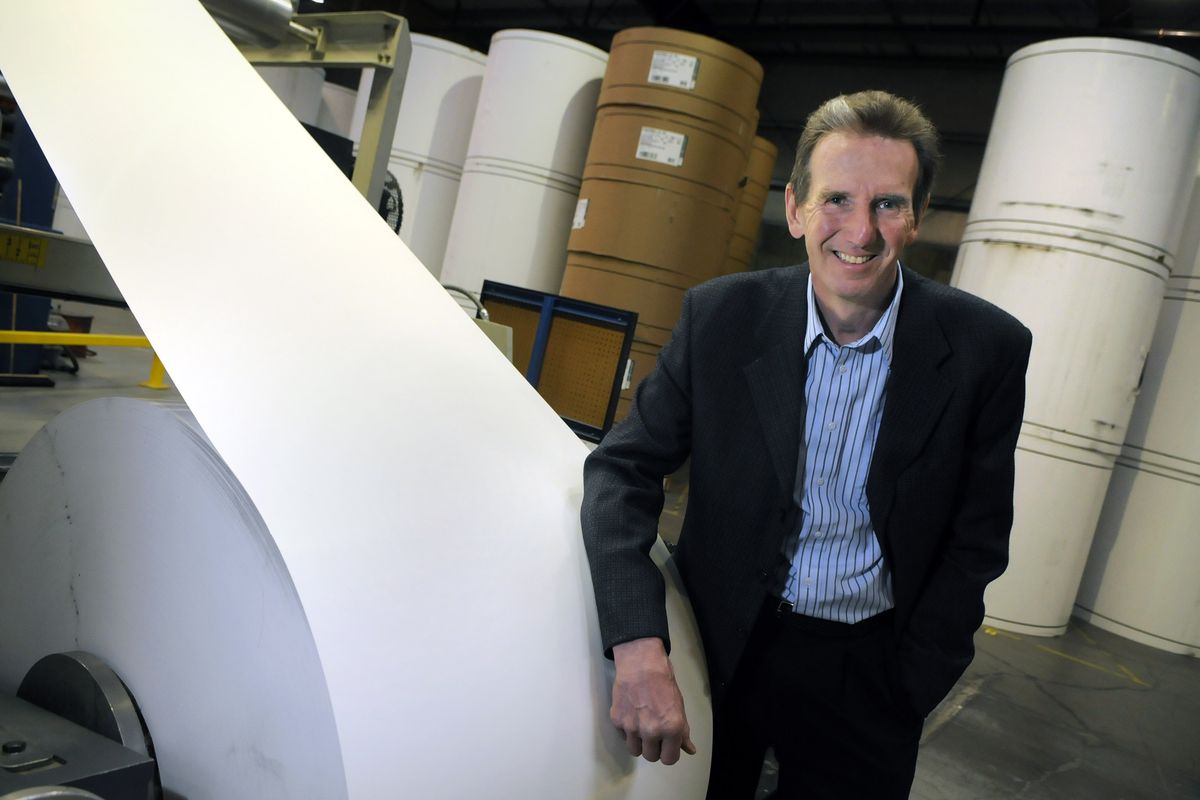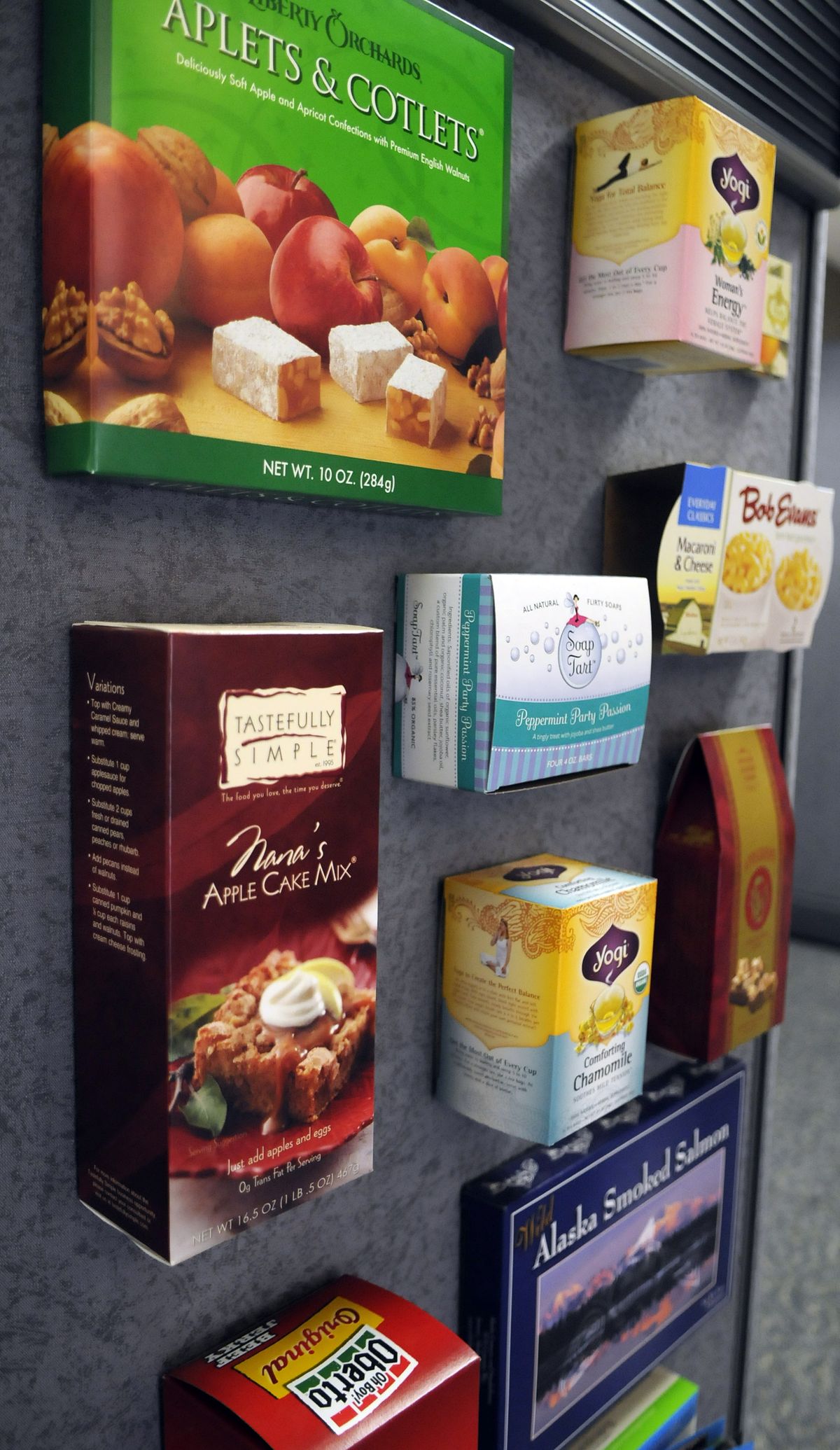The whole package
Sonderen Packaging evolves while staying true to customer base
Company President Mark Sonderen joined the payroll of his family’s business at 16, for $1.25 an hour. (Dan Pelle)Buy a print of this photo
Sonderen Packaging was launched in the basement of a downtown print shop 49 years ago. Today it fills a sprawling 130,000-square-foot facility at 2906 N. Crestline St.
Earlier this month, the Association of Washington Business recognized the company for its “commitment to workplace excellence, innovation and safety.”
The family-owned manufacturer also is a leader in waste reduction, energy efficiency and pollution reduction.
The company’s evolution was among the topics President Mark Sonderen discussed during a recent interview.
S-R: Why did your parents open a box factory?
Sonderen: My father had been in the industry for years when he came to Spokane in 1951. The company he worked for was bought by Boise Cascade in 1959. By 1963, my dad wasn’t happy with where things were going, and customers encouraged him to start his own company. A few years later, Boise got out of the folding-carton business and Dad was able to expand.
S-R: What is your primary product?
Sonderen: We make the lighter-weight, paperboard boxes you see in the grocery store for things like tea and cereal. We also make packaging for ammunition.
S-R: Could someone start a folding-carton company now?
Sonderen: It would be very difficult and foolish. It’s capital-intensive, and the industry is very mature. Sixty percent of the folding cartons are done by four conglomerated companies, and the rest is divided among independents like us. In the past 10 years, probably 20 percent of the folding-carton plants have closed. Just today I was picking up used machinery from a Los Angeles company that shut its plant after 50 years.
S-R: Usually a manufacturer locates close to its resources or its customers.
Sonderen: We aren’t in a good location for a folding-carton plant. Only about 5 percent of our business is in the Spokane area. But our best resource is our reliable labor. Spokane wages are comparable to Salt Lake and the Midwest, so we can compete in the Seattle, Portland and Southern California markets. Also, a lot of empty trucks head back to Southern California, so we get exceptional freight rates. And we’re the closest folding-carton plant to (supplier) Clearwater Paper in Lewiston.
S-R: Who are your clients?
Sonderen: Most of our business is in Seattle and Portland, but there are some key accounts in the region. The Aplets & Cotlets people in Cashmere and ATK ammunition down in Lewiston are great clients.
S-R: That’s an interesting combination.
Sonderen: Yeah, we have candy, ammunition, Reser’s fresh mashed potatoes and Stash Tea.
S-R: What’s the most unusual product sold in your cartons?
Sonderen: I’m not sure you want to publish this. It was a sexual lubricant, and we made a box that looked like a pair of jeans with a zipper on it. It was really clever.
S-R: Was your parents’ business successful from day one?
Sonderen: The first months had Dad concerned, but he made a profit the first year.
S-R: How has the business evolved since 1963?
Sonderen: About every 10 years we grew. We moved to North Crestline in 1967, and then added a building in ’77. In ’88 we added another building, and in ’98 we were adding another addition when we had a fire. But we recovered, and in 2004 I bought a plant in Seattle and consolidated that into our business.
S-R: What’s your earliest recollection of the business?
Sonderen: I was 11 years old when my dad started it, and I remember going down to the box plant, getting under the machines and helping pull the grease trays out.
S-R: Were you paid?
Sonderen: I wasn’t officially on the payroll until I was 16, and then I got minimum wage – $1.25 an hour.
S-R: Did you ever work anywhere else?
Sonderen: No. I always liked the business. A few years after I graduated from Gonzaga my father was ready to retire, so he made me president when I was 26.
S-R: Was your father your mentor?
Sonderen: Yes. He was a great salesman, but he also taught me the technical side.
S-R: Any particular lesson that stuck with you?
Sonderen: Whether his customers were small or large, he always made them feel like they were his most important clients. And he gave people in the plant a feeling of ownership.
S-R: What sort of employee fits in best?
Sonderen: We have seven different trades in our plant, and each trade requires particular attributes. Some jobs need someone who’s steady and methodical, while others – like printing – demand a lot more analysis of what’s going on, because you have a moving target.
S-R: How would you describe your leadership style?
Sonderen: Relaxed and relatively democratic. Maybe a benevolent monarch.
S-R: What’s your business philosophy?
Sonderen: Do the right thing and take a long view. My son and my daughter work here now, so we’re getting the third generation going.
S-R: What do you like most about your job?
Sonderen: I had a lot of fun today buying equipment.
S-R: What do you like least?
Sonderen: The frustration of trying to squeeze out a margin. There’s no room for mistakes anymore.
S-R: Anything you wish you’d done differently?
Sonderen: I’d like a do-over on that Seattle company I bought. We missed things that cost us later.
S-R: What’s your biggest challenge?
Sonderen: Trying to figure out where markets are going.
S-R: Did the recession affect your business?
Sonderen: Going into the recession, I was kind of cocky because of our mix of business. We’ve always held steady or grown through past recessions. This time, everything crashed – everything except ammunition. But by 2011 we were back to where we were in 2008, and we expect a small amount of growth this year.
S-R: Any favorite customer reactions?
Sonderen: When we had the fire 14 years ago, we didn’t lose any business because of the loyalty we’d cultivated with our customers, our suppliers and our competitors. Machinery companies jumped through hoops to make sure I got equipment. And seven different box plants helped us keep manufacturing. Relationships have always been a big part of our success.
S-R: If you hadn’t joined the family business, what career might you have chosen?
Sonderen: I’d be selling something.
S-R: How do you relax?
Sonderen: I’m working on a new career, and if I gave it a name, I’d call it leisure. I’m a waterfowl hunter, and I snow ski and snowmobile. I don’t have trouble finding outdoor activities to do.

